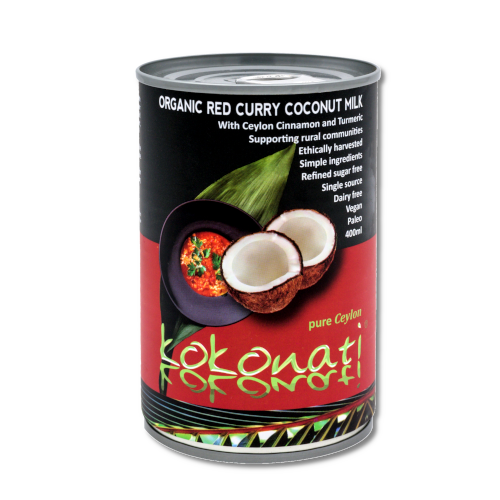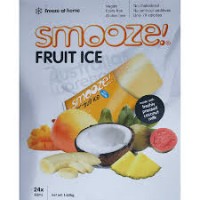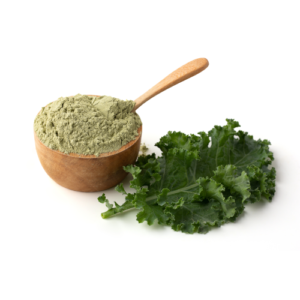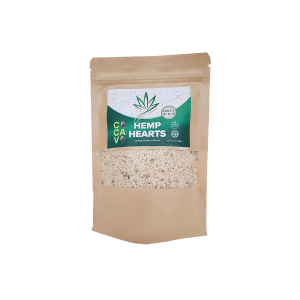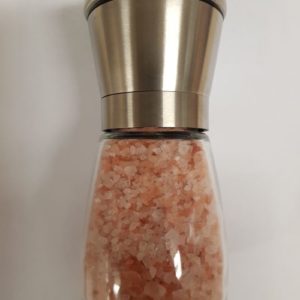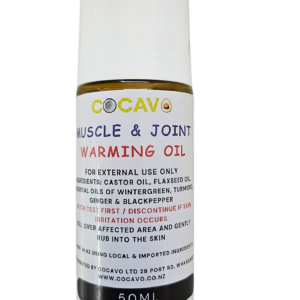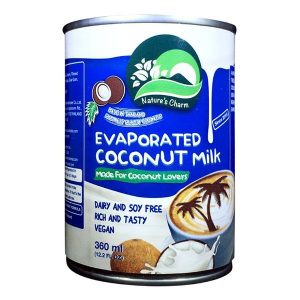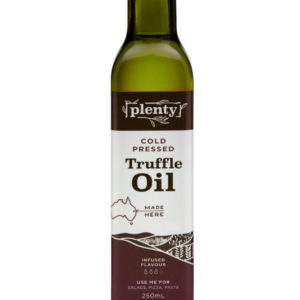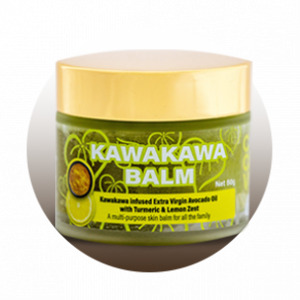Description
Versatile – Kokonati organic red curry coconut milk is made with milk from freshly grated coconut meat from mature kernels and ground warming spices; red chili*, turmeric*, Ceylon cinnamon*, pepper*, curry leaves*, ginger*. A bit of brownish liquid, which comes from the coconut shell paring, may naturally appear in some cans when the milk settles. This just goes to prove our product is 100% natural and not standardized by chemical processes. As we do not use preservatives, we do have to flash pasteurize the spiced milk to be able to preserve, package and ship it from our tropical shores to cooler countries with climates not suitable for growing coconuts. How else can we share such a wonderful superfood with the rest of the world!
Serving suggestionRed curry coconut milk can be used as a dairy-free alternative, as a base for sauces, stews, and curries. Use Kokonati mildly spiced red curry coconut milk enriched with red chili*, turmeric*, Ceylon cinnamon*, pepper*, curry leaves*, ginger*, in cooking and baking. Flavor sauces, curries, noodles, rice, soups, and even spiced cocktails! Simmer boiled chickpeas, lentils, stir-fried vegetables (eg. eggplants, cauliflower, carrot, zucchini, green beans, broccoli), rice noodles, and tofu for a one-pot meal. Just add stir-fried vegetables, protein, and or lentils to make a quick one-pot meal. OR make it a main by adding rice and noodles also to it! For a quick one-pot spread, side or main, just simmer washed lentils with the red curry coconut milk until cooked through and mushy, then use as a filling, whip into a dip, or as a spread for sandwiches/wraps.
Tips for adjusting spice level ( inspired by a customer, Theresa’s comment). The spice level in our curry milk ( Red & Green) can be taken to both sides of the spicy spectrum.
*For medium to hot spicy, make curry as is and tip the whole can or proportionately for less number of servings.
*For lighter spice levels, you can add more coconut milk/ cream/ coconut milk powder to dilute the curry milk and make it creamier. Alternatively use a little of the green/red curry milk (freezing the rest in an icecube tray for later) and add coconut milk/ cream/ coconut milk powder to taste.
Before useContents may separate naturally. Before use, shake can or stir well to get an even texture. In cold weather (under 22 Deg C) place the can in a warm water bath for a few minutes and then shake well before opening. If needed strain through a sieve for extra free flow, using a spatula to force through any unmelted coconut milk fat through the sieve. A little elbow grease is needed to use this 100% natural product!
FlavorAroma and taste is freshly coconut with mild spice notes of ceylon cinnamon, turmeric, black pepper and ginger. Depending on the harvest and season every batch of red curry coconut milk can vary in color and to a minor degree in taste as it is a natural cottage-industry product that does not use any chemical refining, additives, or preservatives to standardize the product like with large-scale commercially standardized coconut milk.
Ingredients
Coconut kernel*, water⁺, red chili*, turmeric*, Ceylon cinnamon*, pepper*, curry leaves*, ginger*, xanthan gum, guar gum, salt
*Organic ingredients from Sri Lanka. 100% Vegan, No soy, No gluten, No dairy, No GMO.
⁺Hot water is used to express the milk locked inside freshly grated coconut kernel.
Storage – Keep in the pantry while unopened. With a best before of two years from the manufacture date, coconut milk remains safe to use for even longer periods if it is stored with minimal exposure to light and air. Refrigerate on opening in a non-metal airtight container. Use within 3-4 days of opening. Freeze in ice cube trays for prolonged use. Kokonati red curry coconut milk is packed at the origin, in the very plantations, the coconut and spices are harvested from, to seal the freshness and reduce exposure from day one.
Kokonati Promise – There is nothing else. No refining or coloring. 100% zero-waste, all bi-products and waste material in our coconut products manufacture are utilized in the making of other nature-friendly products. See how. This product is internationally accredited by Control Union; Certified Organic (EU and USDA NOP), ISO, and/or HACCP certified.
Benefits – Why coconut milk? Coconut milk is naturally rich in saturated fats, mainly short and medium-chain fatty acids (MCTs). MCTs are usually not stored by the body as fats. Instead, it is metabolized by the body to provide instant energy. Almost a quarter of a portion of coconut milk contains MCTs, mainly Lauric acid. Lauric acid is believed to boost the immune system and has been shown to promote brain development and bone health. This is why one of the richest natural sources of Lauric acid is mother’s milk. Next to mother’s milk, coconuts are the richest source of Lauric acid. “Lauric acid has microbial properties, so it can help protect against bacterial infection” notes Paul May, a professor at Bristol University in England. Lauric acid may also help in maintaining the elasticity of the blood vessels and in keeping them clean, which in turn could also lower the risk for conditions like, atherosclerosis and heart disease. Coconut trees grow in rich volcanic soil, contributing to the high mineral content of coconut. About 22% of the recommended daily allowance of iron ( for women, it is lower for men) can be absorbed from a recommended serving of Coconut milk. With such a high level of iron, consuming coconut milk regularly could naturally decrease iron deficiency disorders. Apart from the beneficial MCT’s & mineral content, coconut milk also contains several antioxidant compounds, which can provide protection against harmful free radicals and their damaging effects on the body cells and tissues. Coconut milk can promote a healthy gut by relieving gastric symptoms, stomach ulcers, and even acid reflux. And if all those benefits aren’t enough. Coconut milk can even help to relax nerves and muscles, control blood sugar levels, lower blood pressure and reduce joint inflammation. In addition to the benefits of consuming coconut milk, the spices in the red curry coconut milk can heal inflammation and ease digestion making it the perfect base for a healthy meal!
100+ years of coconut expertise – Our coconut milk sales supports the traditional livelihoods of villagers in the rural coconut triangle of Sri Lanka. Our Coconut milk is made by a third-generation coconut miller an engineer by profession who has fine-tuned the process of extracting the best quality milk backed by generations of coconut expertise. The mill also operates a not-for-profit brick and tile factory at the rear and a metal workshop that provides work for the youngsters of the village, building material for the community, and keeps the factory equipment ship-shape! Staff quarters are also provided for those who travel far from home. Backed by generations of coconut expertise, and certified with ISO and Organic standards, the mill plays a vital role in the employment, welfare, and wellbeing of the village community. The management ensures the children of their workforce have access to school books and stationery for the entire school year! The mill also organizes religious and cultural events to inculcate a sense of belonging to a bigger cause, bringing a sense of pride and community to the villagers who are using age-old knowledge, treading lightly, and making a living for their families, sustainably.
Price for quality – Kokonati products are not mass-produced in vast industrialised factories. So we do not enjoy the economies of scale that supermarket brands do. We pay the millers and farmers a fair price. Specifically, batch-crafted for New Zealand, Kokonati products are made with multigenerational expertise and knowledge to be the best quality they can be and so easily justify the premium price for the premium quality you are getting.
Is Coconut Milk better than dairy milk?With evolving climate-change and cruelty-free movements combined with results from scientific studies and research, touting the many inhumane aspects of dairy farming, health complications, and allergies caused by dairy; there is a little voice in every ‘conscious’ consumer’s mind to, at the very least, reduce the number of dairy products they consume. There are many dairy-free butter alternatives; seeds & nuts butter, even our raw creamed coconut butter, and toasted coconut butter are tasty alternatives. There are many vegan ‘cheese’ options that are made from coconut flour and soy products too. Cutting down on dairy intake could be a start. Given the many dairy-free kinds of milk available now; Coconut Milk, Coconut cream Almond Milk, Rice Milk, Hemp Milk it is quite easy to go dairy-free!
Make a conscious decision; if you have read this article this far and it made sense to you, you are old enough not to be drinking from anyone’s mammary glands!
Packaging and recycling – Available in 400ml BPA free , easy-open tabbed aluminum cans. A light warm soak or a run under the hairdryer will remove the labels which are biodegradable and can be composted or disposed of in the garbage bin. Dispose of the recyclable aluminum can in your recycling bin.
Word of caution. Coconut milk is high in fiber, so if you are new to consuming it, it is best to increase intake gradually allowing the gut to slowly get accustomed to it.

